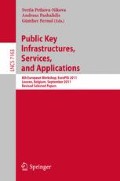Introduction
Two main families of cryptographic techniques have been proposed for realizing open-audit remote elections on adversarially controlled networks: one is based on the homomorphic aggregation of encrypted ballots, while the other anonymizes ballots by transferring them through a network of mixes.
Access this chapter
Tax calculation will be finalised at checkout
Purchases are for personal use only
Preview
Unable to display preview. Download preview PDF.
References
Adida, B.: Helios: web-based open-audit voting. In: Sec 2008: Proceedings of the 17th Conference on Security Symposium, pp. 335–348. USENIX Association, Berkeley (2008)
Adida, B., de Marneffe, O., Pereira, O., Quisquater, J.J.: Electing a University President Using Open-Audit Voting: Analysis of Real-World Use of Helios. In: Jefferson, D., Hall, J.L., Moran, T. (eds.) Electronic Voting Technology Workshop/Workshop on Trustworthy Elections. Usenix (August 2009)
Baudron, O., Fouque, P.A., Pointcheval, D., Stern, J., Poupard, G.: Practical multi-candidate election system. In: Symposium on Principles of Distributed Computing, pp. 274–283. ACM (2001)
Bulens, P., Giry, D., Pereira, O.: Running mixnet-based elections with Helios. In: Shacham, H., Teague, V. (eds.) Electronic Voting Technology Workshop/Workshop on Trustworthy Elections. Usenix (2011)
Cohen, J.D., Fischer, M.J.: A robust and verifiable cryptographically secure election scheme (extended abstract). In: 26th Annual Symposium on Foundations of Computer Science, pp. 372–382. IEEE (1985)
Cramer, R., Gennaro, R., Schoenmakers, B.: A Secure and Optimally Efficient Multi-authority Election Scheme. In: Fumy, W. (ed.) EUROCRYPT 1997. LNCS, vol. 1233, pp. 103–118. Springer, Heidelberg (1997)
Damgård, I., Jurik, M.: A Generalisation, a Simplification and Some Applications of Paillier’s Probabilistic Public-Key System. In: Kim, K. (ed.) PKC 2001. LNCS, vol. 1992, pp. 119–136. Springer, Heidelberg (2001)
Furukawa, J., Sako, K.: An Efficient Scheme for Proving a Shuffle. In: Kilian, J. (ed.) CRYPTO 2001. LNCS, vol. 2139, pp. 368–387. Springer, Heidelberg (2001)
Groth, J.: A Verifiable Secret Shuffle of Homomorphic Encryptions. In: Desmedt, Y.G. (ed.) PKC 2003. LNCS, vol. 2567, pp. 145–160. Springer, Heidelberg (2002)
Haustenne, L., De Neyer, Q., Pereira, O.: Elliptic curve cryptography in javascript. In: ECRYPT Workshop on Lightweight Cryptography (2011)
Neff, C.A.: A verifiable secret shuffle and its application to e-voting. In: Proceedings of the 8th ACM Conference on Computer and Communications Security, pp. 116–125. ACM (2001)
OSCE/ODIHR: Estonia parliamentary elections, 6 march 2011 – OSCE/ODIHR election assessment mission report (May 2011), http://www.osce.org/odihr/77557
Sako, K., Kilian, J.: Receipt-Free Mix-Type Voting Scheme - a Practical Solution to the Implementation of a Voting Booth. In: Guillou, L.C., Quisquater, J.-J. (eds.) EUROCRYPT 1995. LNCS, vol. 921, pp. 393–403. Springer, Heidelberg (1995)
Wikström, D.: A Universally Composable Mix-Net. In: Naor, M. (ed.) TCC 2004. LNCS, vol. 2951, pp. 317–335. Springer, Heidelberg (2004)
Author information
Authors and Affiliations
Editor information
Editors and Affiliations
Rights and permissions
Copyright information
© 2012 Springer-Verlag Berlin Heidelberg
About this paper
Cite this paper
Pereira, O. (2012). Ballot Aggregation and Mixnet Based Open-Audit Elections. In: Petkova-Nikova, S., Pashalidis, A., Pernul, G. (eds) Public Key Infrastructures, Services and Applications. EuroPKI 2011. Lecture Notes in Computer Science, vol 7163. Springer, Berlin, Heidelberg. https://doi.org/10.1007/978-3-642-29804-2_8
Download citation
DOI: https://doi.org/10.1007/978-3-642-29804-2_8
Publisher Name: Springer, Berlin, Heidelberg
Print ISBN: 978-3-642-29803-5
Online ISBN: 978-3-642-29804-2
eBook Packages: Computer ScienceComputer Science (R0)

